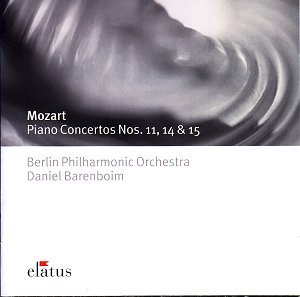The Elatus label offer here a digital re-release
from the often idiosyncratic Argentinean pianist Daniel Barenboim
in three of Mozartís piano concertos. He also directs the Berlin
Philharmonic Orchestra.
The first piano concerto on this release is the
No. 11, in F major K.414 which was composed probably in the winter
of 1782-83 in Vienna. Mozart wrote to his father explaining that
this concerto together with K.413 and K.415, which were composed
close together, were to be a happy medium between being easy and
difficult and brilliant and pleasing without being empty. He went
on to say that these concertos had elements that would afford
satisfaction not only to the knowledgeable but provide pleasure
to the less perceptive; although they wouldnít know why.
The piano concerto No. 14 in E flat major K.449
was composed in 1784. A critic Eric Blom considered that the concerto
displayed a distinctly new manner. He felt there was something
dark and melancholy about the concerto; even a suggestion of tragedy.
1784 was also the year of composition of the
final piano concerto on this release No. 15, in B flat major K.450.
Mozart conceived the concerto as one of his most technically difficult
with the highest virtuoso writing. Clearly Mozart found its composition
demanding as his numerous amendments to the score seem to bear
out.
There is fine orchestral playing from the Berlin
Philharmonic who Barenboim conducts from the piano but his solo
playing gives me an overall impression of just another day at
the office. At times I was crying out for some of that legendary
Barenboim idiosyncrasy to show itself. Although this is more than
acceptable playing from the soloist it does strike me as lacking
the vitality and sparkle that he displays on the complete set
of piano concertos that he recorded some 30 years earlier with
the ECO, on EMI CES5 72930-2. The fact that the concertos K.449
and K.450 are live recordings does not seem to stir Barenboim
from his comfortable mode. Perhaps being comfortable is the underlying
problem here for a soloist who seems to have lost some of the
freshness and reverence for the great composers that his earlier
EMI recording exudes.
There are many superb versions of these works
to choose from in the catalogue, several of which are at super
budget price. I would not recommend this Elatus recording that
Barenboim recorded between 1996-97 against much of the competition
and would choose the following as individual recommendations:
The most feted version of the piano concerto
No. 11 K.414 is that from Murray Perahia with the ECO on Sony
SK 42243, which is coupled with the piano concertos Nos 12, K.414
and 14 K.449.
My premier recommendation of the piano concerto
No. 14 K.449 is the version by Alfred Brendel with the ASMF under
Sir Neville Marriner, which includes six other piano concertos
and other piano works, on Philips 446921-5.
Murray Perahiaís version with the ECO on Sony
SK 37824 would be my first version of the piano concerto No.15
K.450 which is coupled with the piano concerto No.16 K.451.
Any reader who requires the complete set of Mozartís
concertos for piano (the earliest 4 concertos after J.C. Bach
have been omitted) should look no further than Murray Perahiaís
analogue/digital recordings, with the ECO on Sony SK12K 46441.
At super budget price I have always been an advocate
of the complete set from Jeno Jando with the Concentus Hungaricus,
under the conductors Andras Ligeti, Ildiko Hegyi and Matyas Antal
available on separate Naxos discs. Jando, I feel does not offer
any amazing insights into the works - just consistently wonderful
playing throughout. The performances would outshine many of those
from his more eminent competitors if the identities of the performers
were unknown during a hearing.
The booklet notes are most comprehensive but
perhaps too technical - more than is necessary. The sound quality
is good but like the performances they donít sparkle.
Good performances but Barenboim is left behind
by the exceptionally strong competition that is available in these
works.
Michael Cookson
